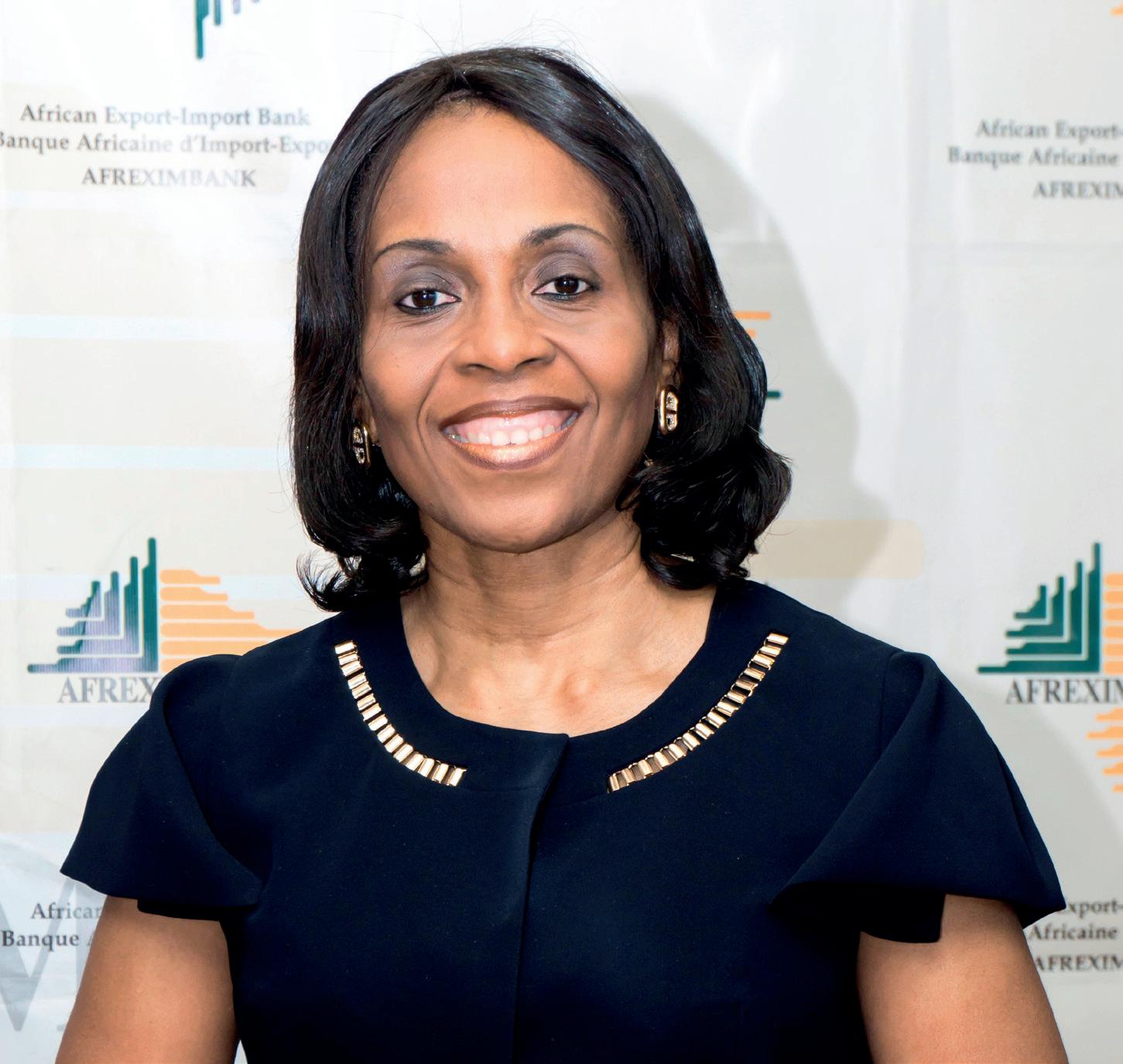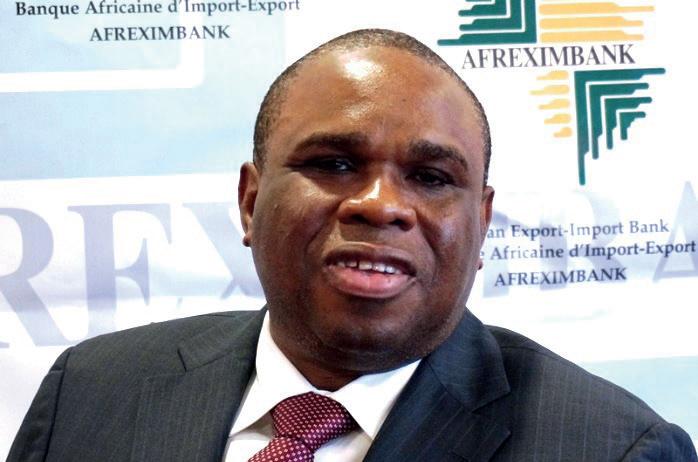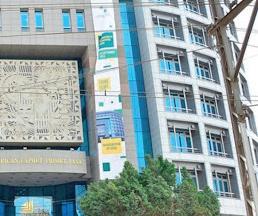
14 minute read
Afreximbank role in intra-regional trade
AFRICA NEWS AGENCY

Advertisement
«ACCESS TO FINANCE FOR SMES WOULD PLAY A KEY ROLE IN INTRA-REGIONAL TRADE»
The African Export-Import Bank (Afreximbank), a pan-African multilateral fi nancial institution whose mandate is to fi nance and promote intra- and extra-African trade, has been accompanying the implementation process of the AfCFTA, since its fi rst steps in 2018. This includes the creation of a dedicated fund, «MANSA», a pan-African due diligence framework for fi nancial institutions, and the deployment of a Pan-African Payment and Settlement System. And more broadly, through advocacy in favor of the continent’s businesses, especially SMEs, so that they are the primary benefi ciaries of the Agreement.

Kanayo Awani, Managing Director of the IntraAfrican Trade Initiative at Afreximbank - Photo credit Afreximbank- RR
“Given that access to fi nance remains a key constraint to SME operations, availability of sustainable trade fi nance, especially for SMEs, will remain the key lubricant to propel the AfCFTA,” Kanayo Awani, Managing Director of the Intra-African Trade Initiative at Afreximbank recently stressed. She reminded that “SMEs constitute the greatest proportion of the continent’s industrial fi ber, accounting for about 80% of businesses and employing not less than 70% of the continent’s workforce.,”
Indeed, Afreximbank considers factoring as a viable alternative fi nancing instrument for supporting Small and Medium-sized Enterprises (SMEs) at a time when traditional commercial bank lending is tightening while trading is about to begin under the African Continental Free Trade Area (AfCFTA). Against this backdrop, the Model Factoring Law, developed and promoted since 2016 by Afreximbank, has become more relevant than ever.
Increasing intra-African trade in the context of post-COVID-19 recovery
ATF 2021 will focus on AfCFTA - Photo credit: Afreximbank- DR

medium-sized enterprises (SMEs) on the continent. Many businesses still have limited access to trade fi nance, mainly due to perceived potential risks and losses. “The Factoring volumes in Africa grew by 10% to EUR 24 billion in 2019 with Afreximbank supporting this growth by providing fi nancing to emerging factoring companies in Cameroon, Senegal, Congo, Zimbabwe, Botswana and Nigeria.” She concluded: given that access to fi nance remains a key constraint to SME operations, availability of sustainable trade fi nance, especially for SMEs, will remain the key lubricant to propel the AfCFTA, the single largest trading bloc globally, towards the realization of its aspirations.”
To support SMEs that cannot obtain traditional bank funding, Afreximbank proffers the use of open account transactions which are cheaper than letters of credit and simply involved a business selling its receivables at a discount to a third party called a factor.
The Bank has been supporting the promotion and development of factoring for over 12 years by extending factoring lines of credit to factoring companies and banks offering factoring services, carrying out education and awareness campaigns as well as advocating for enabling legal and regulatory environment for factoring to thrive on the continent, amongst others.
“Egypt, for instance, reviewed and promulgated a new factoring law in 2018 using the Afreximbank Factoring Model Law as Guide and this has contributed to the sharp growth in Factoring activities.”
A US$10 billion fund for African companies
This is why the Institution, which accompanies the implementation process of the AfCFTA from its fi rst steps, set up, last February, a fund of about ten billion US dollars (5 455.147 billion CFA francs), for African companies. Housed at the AfCFTA Secretariat, the fund will take into account contributions from states and general funding. “Given that access to fi nance remains a key constraint to SME operations, availability of sustainable trade fi nance, especially for SMEs, will remain the key lubricant to propel the AfCFTA, the single largest trading bloc globally, towards the realization of its aspirations.”
AFRICA NEWS AGENCY


“Towards the path of transformation... the AfCFTA is expected to build African economies...Afreximbank will do everything possible to support the AfCFTA Secretariat,» said Afreximbank President, Professor Benedict Oramah. «An opportunity to build the capacity of African business leaders, increase Africa’s share of global trade to transform the economy and accelerate development,» commented Verra Songwe, Executive Secretary of the Economic Commission for Africa (ECA). A few months earlier, in November, Afreximbank launched another tool also designed to accompany African companies to the continental market, MANSA, Africa’s Digital Due Diligence Repository. Dedicated to fi nancial institutions, companies and SMEs, Mansa has been developed to address the perceived risk of doing business in Africa and with Africans
« We created MANSA as a solution to the negative impact on Africa »
MANSA is a single source of the primary data required for Customer Due Diligence (CDD) and Know Your Customer (KYC) checks on African entities, including fi nancial institutions, corporates and SMEs, in accordance with best practices, said the Bank. The Platform will also serve to address key trade related challenges facing the continent, including, the lack of market information, the high cost of doing business in Africa and discovering African counterparties.”
“In a fragmented continent of 55 countries that hardly traded among themselves since they became colonies, MANSA offers an opportunity to begin bringing down the borders and support the realization of the goals of the African Continental Free Trade Agreement (AfCFTA).”

Afreximbank launched the operations of ‘MANSA’, a pan-African customer due diligence repository for fi nancial institutions, corporate entities and SMEs, developed to address the perceived risk of doing business in Africa and
with Africans - Crédit photo Afreximbank
The platform is named after Mansa Musa, the Emperor of the Malian Empire in the 1300s, who was responsible for opening up trade across Africa and believed to be the only person ever to control the fl ow of gold between Africa and the Mediterranean.
In this initial phase of implementation, MANSA is now open to African businesses to onboard their corporate profi les to the Repository. Following an onboarding and validation process in keeping with the Platform’s compliance requirements, African entities will have their profi les listed and made available to users of the Repository.
A historic step towards the operationalization of the payment system.
In the meantime, another major initiative announced was the deployment of the Pan African Payment and Settlement System, whose Interim Governing Council met on December 3, 2020, a historic step towards the operationalization of the payment system. Developed by African Export-Import Bank (Afreximbank), under the auspices of the African Continental Free Trade Area (AfCFTA) Secretariat and the African Union (AU), PAPSS will enable intraAfrican trade and commerce payments to be made in African currencies « in furtherance of the goals of the AfCFTA. Adopted in July 2019 by the African Union Heads of State as the payment and settlement system to support the implementation of the AfCFTA, PAPSS is expected to create new fi nancial fl ows and successfully facilitate trade and other economic activities among African countries.
Afreximbank is the operator and the main Settlement Agent for PAPSS. The Bank will provide settlement guarantee on the payment system as well as overdraft facilities to all settlement agents.
Following the signature of the African Continental Free Trade Agreement (AfCFTA) in March 2018, Afreximbank became the major supporter of that continental initiative”
“Following the signature of the African Continental Free Trade Agreement (AfCFTA) in March 2018, Afreximbank became the major supporter of that continental initiative,” its president recalled last June 13 during the board of directors of Afreximbank that resulted in his re-election to a fi ve-year term. «In furtherance of that effort, and as promised when I took offi ce in September 2015, Afreximbank has completed the development of a Pan-African Payment and Settlement System (PAPSS), which the African Union (AU) adopted in July last year as the payment and settlement system to support the implementation of the AfCFTA.

We expect the Platform to commence piloting in 6 countries by the fourth quarter of this year and expanded to other parts of the continent shortly afterwards. We have also developed a Trade Information Portal (TIP) that will use Artifi cial Intelligence (AI) to predict regional supply chains. A Trade and Investment Regulations portal and the African
Customer Due Diligence Repository Platform (MANSA), all intended to remove the challenges to intraregional trade caused by a lack of access to information, will become operational in a few months. We are determined
to use technology to bring down the barriers to intra-African trade caused by Africa’s fragmented and atomistic economies; we are convinced that it is technology that will fi rst bring down the borders before the physical borders destined to the dustbins of history actually disappear.”
AFREXIMBANK’S REPORT ON INTER-AFRICAN TRADE
Dr. Benedic Oramah, President of Afreximbank- Photo credit Afreximbank-RR
Trade between African countries could increase to as much as $231 billion once the African Continental Free Trade Area (AfCFTA) is implemented, according to a report by the African Export-Import Bank (Afreximbank).
The African Continental Free Trade Area has the potential to pave the way for the formalization of informal cross-border trade (ICBT), notes this pan-African multilateral trade fi nance institution established in 1993 under the auspices of the African Development Bank.
According to the report, the export potential of intra-African trade remains untapped, currently at over $84 billion. «The untapped proportion is based on sectors that have already proven to be internationally competitive and have good prospects for export success in other African markets,» the report by Afreximbank and the United Nations Economic Commission for Africa (UNECA) said in part.
Products with the greatest export potential include minerals, machinery, food products, motor vehicles and parts, and plastics and rubber, the report said Thursday, according to Kenyan media.
The untapped fi gure of $84 billion is mostly concentrated in southern Africa, with $53 billion in total. North Africa comes next with $13.4 billion, followed by West Africa with $9.5 billion and East Africa with $7.8 billion (Sh870.5 billion). Central Africa comes last with only $840 million.
Southern Africa will be by far the engine of these exports. Indeed, they are worth nearly $50 billion. Countries in this region «have already proven their international competitiveness and have good prospects for success in other African markets. This is in sectors such as mining, machinery, food products, vehicles and parts, plastics and rubber.
This is followed by North Africa (about $10 billion), West Africa (about $5 billion), East Africa and Central Africa. Afreximbank has therefore highlighted an additional promise of the AfCFTA. To deliver on all of them, AfCFTA will have a strong need to leverage technology, especially for ecommerce.
AFRICA NEWS AGENCY


ABOUT AFREXIMBANK
The African Export-Import Bank (Afreximbank) is a PanAfrican multilateral fi nancial institution with the mandate of fi nancing and promoting intraand extra-African trade. Afreximbank was established in October 1993 and owned by African governments, the African Development Bank and other African multilateral fi nancial institutions as well as African and non-African public and private investors. The Bank was established under two constitutive documents, an Agreement signed by member states, which confers on the Bank the status of an international organization, and a Charter signed by all Shareholders, which governs its corporate structure and operations. Afreximbank deploys innovative structures to deliver fi nancing solutions that are supporting the transformation of the structure of Africa’s trade, accelerating industrialization and intra-regional trade, thereby sustaining economic expansion in Africa. At the end of 2019, the Bank’s total assets and guarantees stood at USD$15.5 billion and its shareholders’ funds amounted to US$2.8 billion. Voted «African Bank of the Year» in 2019, the Bank disbursed more than US$31billion between 2016 and 2019. Afreximbank has ratings assigned by GCR (international scale) (A-), Moody’s (Baa1) and Fitch (BBB-). The Bank is headquartered in Cairo, Egypt.

For more information, visit: www.afreximbank.com.
Headquarters of the Bank, in Cairo - Photo credit Afreximbank-RR
Over US$30 billion in support of African trade
Between 2015 and 2019, the Bank disbursed over US$30 billion in support of African trade with about US$15 billion channeled towards the fi nancing and promotion of intra-African trade.
« Our theory had always been that Africa had suffi cient resources to meet a signifi cant proportion of its short and mediumterm fi nancing needs. We fi rmly believe that it is the control of our fi nances that will pave the way for Africa’s economic independence! Argued the Professor. Our ultimate goal under my second term of offi ce is to facilitate an early realization of Africa’s ambitions of creating an integrated market; a continent where intra-regional supply chains will blossom; a continent where “Made in Africa” will be carried as a stamp of pride and honor; an Africa where a farmer in a village in Zambia will not need foreign currency to purchase a Nollywood movie on-line; an Africa where youth will have abundance of opportunities so that the carnage we see every now and then as Africa’s youth attempt to cross the Mediterranean becomes history. We want an Africa where the foundations of the AfCFTA are laid expeditiously so that the 84,000 kilometers of borders that have divided us for ages can begin to go down.”
Intra-African investments will be the main driver of intra-African trade”
Towards this goal, we will aim to double intra-African trade fi nancing so that by the end of my term, it would constitute no less than 40% of the Bank’s total assets, with aggregate
disbursements, on a revolving basis, over the 5 years exceeding US$30 billion. “Intra-African investments will be the main driver of intra-African trade in a dynamic sense, so our Intra-African Investment Financing Facility will be emphasized.” And Professor Oramah concludes: “Africa may be poor today, but as I look

ABOUT THE INTRA-AFRICAN TRADE FAIR (IATF2021)
The second edition of the biennial Intra-African Trade Fair (IATF) will take place in Kigali from 8 to 14 December 2021. IATF2021 will provide a platform that will allow trade under the African Continental Free Trade Agreement. It will serve as a marketplace that will bring together continental and global buyers and sellers. It will enable stakeholders to share trade, investment and market information as well as trade fi nance and trade facilitation solutions designed to support intra-African trade and African economic integration. In addition to establishing a business-to-business and a businessto-government exchange platform for business deals and advisory services, IATF2021 will also operate IATF2021 Virtual, an interactive online platform accessible to all. It will also focus on Africa’s creative economy as well as the automotive industry with dedicated programs. A Conference will run alongside the exhibition and will feature high-profi le speakers and panelists addressing topical issues relating to trade, trade fi nance, payments, trade facilitation, trade-enabling infrastructure, trade standards, industrialization, regional value chains and investment.
To register as a delegate or as an exhibitor for IATF2021 please visit: www.intrafricantradefair.com
into the future, I see a transformation. AfreximBank is well positioned to facilitate the realization of that transformation.”
Providing SMEs with the tools to respond more effectively to the economic and social challenges presented by pandemic
In concrete terms, it will involve providing training to managers and owners of micro, small and medium enterprises (MSME), to be given the knowledge and skills they need to engage effectively in cross-border trade. “African businesses will have the opportunity to learn, plan and succeed in growing their business by taking full advantage of the AfCFTA,” said Dorothy Tembo, ITC acting Executive Director. The training program, run via ITC’s popular, multilingual SME Trade Academy platform, under the auspices of the Afreximbank Academy (AFRACAD), will be piloted in Nigeria, Rwanda, and Cote d’Ivoire.
In the meantime, Afreximbank is inviting companies from across the continent to participate in the second Intra-African Trade Fair (IATF2021) to be held from December 8 to 14, 2021, in Kigali.
“IATF2021 will bring together continental and global players to showcase and exhibit their goods and services, and explore business and investment opportunities enabled by the single market created by the African Continental Free Trade Agreement (AfCFTA) to accelerate Africa’s integration and industrialization agenda,” announced IATF2021 Advisory Council Chairman and former President of Nigeria.
Organized by Afreximbank in collaboration with the African Union and hosted by the Government of Rwanda, IATF2021 will play a crucial role in assisting and enabling businesses and corporates across Africa to share trade and market information and conclude business deals that are critical in supporting the implementation of the AfCFTA.


